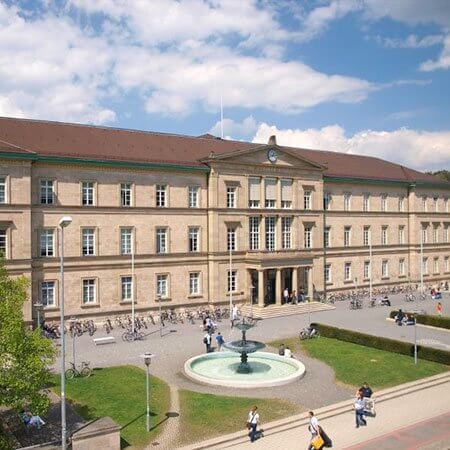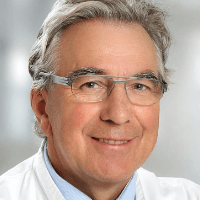Radical Mastectomy for Breast Cancer Treatment in the Best Hospitals in the World
Treatment prices are regulated by national law of the corresponding countries, but can also include additional hospital coefficients. In order to receive the individual cost calculation, please send us the request and medical records.
Breast Cancer Treatment
- Diagnostics
- Reconstruction with an expander or allo prosthesis
- Diep-flap plastic reconstruction with own tissues
- Reconstruction with own tissue or implant after radical mastectomy
- Brachytherapy
- Chemotherapy
- Lumpectomy and lymphadenectomy by metastases to lymph nodes
- Radiotherapy
- Sectoral resection with flap plastic
- Proton Therapy
- Embolization or chemoembolization

Department of Adult and Pediatric Gynecology, Mammology, Obstetrics
According to the Focus magazine, the Department of Adult and Pediatric Gynecology, Mammology, Obstetrics is included in the ranking of the top German departments specializing in obstetrics and breast cancer treatment! The department offers the full range of diagnostics and treatment of diseases of the female reproductive system, breast pathologies. Also, the specialists of the department provide a comprehensive management of pregnancy, childbirth and postpartum care for both mother and child. Key attention is paid to the treatment of female genital cancers, as well as breast cancer treatment. For this purpose, the department has all the modern therapeutic techniques, as well as its our own innovative developments by the department doctors.







Department of Gynecology, Mammology and Obstetrics
The Department of Gynecology, Mammology and Obstetrics offers the full service range in these fields. The department specializes in the treatment of benign and malignant diseases of the female reproductive organs, breast, as well as comprehensive pregnancy management, childbirth and postpartum care. A treatment regimen is developed for each patient individually. Most surgical interventions can be performed using sparing surgical techniques. The department is certified by the German Cancer Society as the Center for Gynecologic Oncology, which indicates strict adherence to national treatment protocols and high quality of treatment.






Department of Adult and Pediatric Gynecology, Mammology, Obstetrics
The Department of Adult and Pediatric Gynecology, Mammology, Obstetrics offers high-precision diagnostics and effective treatment of the full range of diseases of the female reproductive system and breast pathologies. The medical facility also employs a competent team of obstetricians, whose responsibilities include comprehensive management of pregnancy, childbirth, and postnatal care for mother and baby. More than 3,000 babies are born in the department's delivery rooms annually. The department cooperates closely with the UniFee Reproductive Medicine Center, which allows gynecologists to treat female infertility together with reproductive medicine specialists. The department's gynecologists focus on women with reproductive system cancers. The medical facility is certified by the German Cancer Society (DKG) as a specialized center. The specialists also successfully treat endometriosis, one of the most common benign gynecologic diseases. In the field of mammology, priority is given to the provision of medical care to women with breast cancer. Doctors perform comprehensive diagnostics, surgical and conservative treatment, and reconstructive plastic surgery after mastectomy. The department's specialists use state-of-the-art technical resources and their professional skills to provide each patient with high-quality medical service.






Surgery is the main treatment method for breast cancer. Usually the doctor removes the tumor and healthy tissues around it. In some cases, usually with large neoplasms, the breast must be removed completely . This type of surgery is called a mastectomy. Abroad, the operation can be performed without the significant health risks, with good clinical and aesthetic results.
History of mastectomy
Radical mastectomy is the first treatment for breast cancer in history. It was developed by the world famous surgeon William Halsted and described as early as 1894. The surgeon suggested removing the mammary gland alone with the pectoralis major muscle and axillary, subclavian, and subscapularis fatty tissue. Willie Meyer also suggested removing the pectoralis minor muscle. Today we know this operation as the Halsted radical mastectomy.
Despite the large volume of removed tissues, this surgical intervention did not always lead to the patient's recovery. In 70% of cases, breast cancer was detected at a stage that is today called the third stage. Therefore, in the middle of the twentieth century, the most radical variant of mastectomy was developed, i.e. the Urban-Kholdin operation. Nevertheless, it did not become widespread, as it led to severe health consequences and did not show an increase in survival compared with Halsted radical mastectomy.
At the end of the 20th century, the approach to the surgical treatment of breast cancer was revised. Clinical experience and data from numerous clinical trials have demonstrated that most cases of cancer recur after radical operations due to the presence of metastatic foci, while the proportion of local recurrence does not exceed 20%. Therefore, in the 21st century, most breast cancer surgeries are organ-preserving ones. Doctors perform lumpectomy or sectoral resection. During such interventions only the tumor is removed with the capture of 1-2 cm of healthy tissues. Additionally, an intervention is performed on the lymphatic collector, and then a course of radiation therapy starts.
Indications for mastectomy
In the developed countries, surgeons perform mastectomy less and less frequently. With a significant volume of surgery, higher health risks, and poor aesthetic outcomes at the early stages of breast cancer, total mastectomy does not have any advantages in patient survival compared to organ-preserving surgeries.
Therefore, today only 20% of women undergo mastectomy. Most operations are sectoral resections and their the most sparing type – lumpectomy.
Indications for mastectomy include the following.
Advanced stages of breast cancer. If the primary tumor is larger than 5 cm and spreads into the chest wall, then doctors may give preference to mastectomy over an organ-preserving surgery.
Small breasts. If the primary tumor is less than 5 cm in diameter, but it occupies the entire mammary gland, mastectomy is indicated.
Inflammatory breast cancer. This is an aggressive type of cancer. It is poorly visible on mammography, which makes it difficult to make the precise diagnosis. Immediately after tumor detection, stage 3 is diagnosed because the inflammatory breast cancer invades the skin. It grows rapidly and metastasizes early. Every third woman already has distant metastases at the time of diagnosis making. Inflammatory breast cancer usually requires a total mastectomy. Chemotherapy is sometimes given before surgery to reduce the swelling.
Genetic mutations. Some women have gene mutations that dramatically increase their breast cancer risk. Organ-preserving surgery is not the best option for them, because the tumor may recur in the future. Bilateral mastectomy (removal of both breasts) is the best option to ensure breast cancer remission.
Impossibility of performing radiation therapy. Radiation therapy is always performed after a breast-conserving surgery, while after a mastectomy it is not indicated. If a woman does not plan to undergo radiation therapy after surgery, then it is better to remove the breast completely in order to reduce the risk of local recurrence of breast cancer. Mastectomy is also performed when there are contraindications to radiation therapy (e.g. in autoimmune connective tissue disorders or pregnancy). Sometimes women refuse radiation therapy as they want to avoid its side effects. Another possible reason for refusal is inability to attend radiation therapy sessions during 6 weeks.
Two or more breast tumors. If two foci of the oncological process are located at a distance, it is more efficient to remove the entire breast.
Sometimes the surgeon performs a lumpectomy initially, but then expands the operation to a mastectomy. This is possible if cancer cells are found at the edges of the removed tissue.
Types of mastectomy
Mastectomy is not a single operation, but a term that means that the breast is removed completely. Other tissues are often removed along with it. To perform mastectomy the surgeon chooses from dozens of its types. Basic operations are as follows.
Radical mastectomy. It involves the removal of the entire mammary gland with the capture of adjacent tissues: muscles and adipose tissue. This type of mastectomy includes Halsted and Urban operations. Today they are used rarely, only at the advanced breast cancer stages, when the tumor reaches a large size and spreads into muscles.
Modified radical mastectomy. The most common type of mastectomy the surgeon may perform. The most widespread operations are Patey and Madden mastectomy. They are less extensive, preserve the pectoralis minor muscle, and do not remove all fatty tissue.
Skin sparing mastectomy. With this operation, the aesthetic results of mastectomy improve significantly. Surgical intervention allows preserving the skin, and in some cases, the nipple-areola complex. Immediately after a sparing mastectomy, breast reconstruction can be performed with the patient's own tissues or implants.
Simple mastectomy. It is performed rarely. The intervention involves removing the breast while preserving fatty tissue and muscles. The doctor also performs a biopsy of the sentinel lymph nodes to identify possible foci of regional metastasizing.
Breast reconstruction
For most women, it is important not only to cure cancer, but also to maintain an attractive appearance. That is why the reconstructive surgeries are performed to restore the breast. Abroad, they are safe and provide excellent aesthetic results.
Reconstruction can be immediate or delayed. One-stage reconstruction is performed immediately during the mastectomy. Delayed surgery is performed in 6-12 months.
It is possible to restore the mammary gland with patient’s own tissues (flap plastic) or with silicone implants. Using a patient's own tissues gives better and longer-lasting results, but requires additional surgical intervention in the donor area. The doctor harvests the material for breast reconstruction from the abdomen, back, thigh or buttocks.
Health risks
The more extensive the surgery, the worse the possible health consequences. Radical mastectomy is more likely to cause complications than the modified radical mastectomy.
After surgery, the main complications are pain and swelling. Pain medications are prescribed to reduce pain. Early postoperative complications of breast cancer treatment sometimes occur:
- Infections with wound suppuration
- Bleeding
- Lymphorrhea
Basically, surgery is combined with the removal of lymph nodes, since mastectomy is usually performed at stages 2-3 of the cancer. Therefore, most women have lymphorrhea after surgery. A prolonged flow of lymph, over 4 weeks, is considered a pathology.
Health risks are somewhat higher if breast reconstruction is performed. With one-stage reconstruction, complications are more common than with the delayed reconstruction. Necrosis of transplanted tissues is possible. During reconstruction with implants, capsular contractures may develop (i.e. the formation of dense tissues around the silicone implant).
Why is it better to treat breast cancer abroad?
Well-equipped hospitals and highly qualified doctors are waiting for you abroad. The best clinics in the world apply modern approaches to surgery, new types of radiation therapy, individually selected drug treatment for breast cancer.
Several reasons why it is better to have mastectomy abroad are:
- Establishing the precise diagnosis before surgery in order to select the best treatment regimen
- High quality of performing mastectomy with a low risk of local recurrence of breast cancer
- Minimal health risks
- Minimal volume of surgery (the doctor does not remove much healthy tissues, which avoids severe complications)
- Immediate reconstruction of the breast is possible, which guarantees a good aesthetic result
- When performing a mastectomy, the surgeon preserves the skin and the nipple-areola complex whenever possible
- High quality of care after surgery
- Comfortable conditions of stay in the hospital
You can travel to Germany or Israel to perform a mastectomy for breast cancer. When making a decision, it is worth considering the level of medicine, the specialization of the hospital, and the cost of treatment. Usually prices are higher in economically developed countries. If the main criterion for choosing a clinic for you is the cost of treatment, it is better to go to Turkey or India.
Treatment abroad with Booking Health
To undergo a mastectomy abroad, you may use the Booking Health service. On the Booking Health portal you can find information about hospitals, doctors, and prices. You can also compare the cost of treatment in different hospitals and book a medical program at the best price. Booking Health will arrange a trip abroad for you. Services and benefits of the company include the following:
- Choosing the best hospital for breast cancer surgery with the option of breast reconstruction with patient’s own tissues or implants
- Direct communication with the surgeon from the selected clinic
- Reducing the waiting time for surgery and making an appointment at the hospital on dates that are convenient for you
- Lower cost of treatment; prices for breast cancer surgery are reduced due to the absence of additional coefficients for foreign patients
- Reliable information about your expenses, the cost of treatment and individual medical procedures, funds remaining in the account
- Elaboration of the medical program without the need to repeat a previously performed diagnostic procedures
- Elaboration of the medical program for confirming the diagnosis, if necessary
- Communication with the hospital after breast cancer surgery
- Purchase and shipping of drugs
- Organization of additional diagnostics or cancer treatment abroad
Booking Health specialists provide quality services. We will book a hotel and airline tickets for you, organize a transfer from the airport to the hospital and back.

